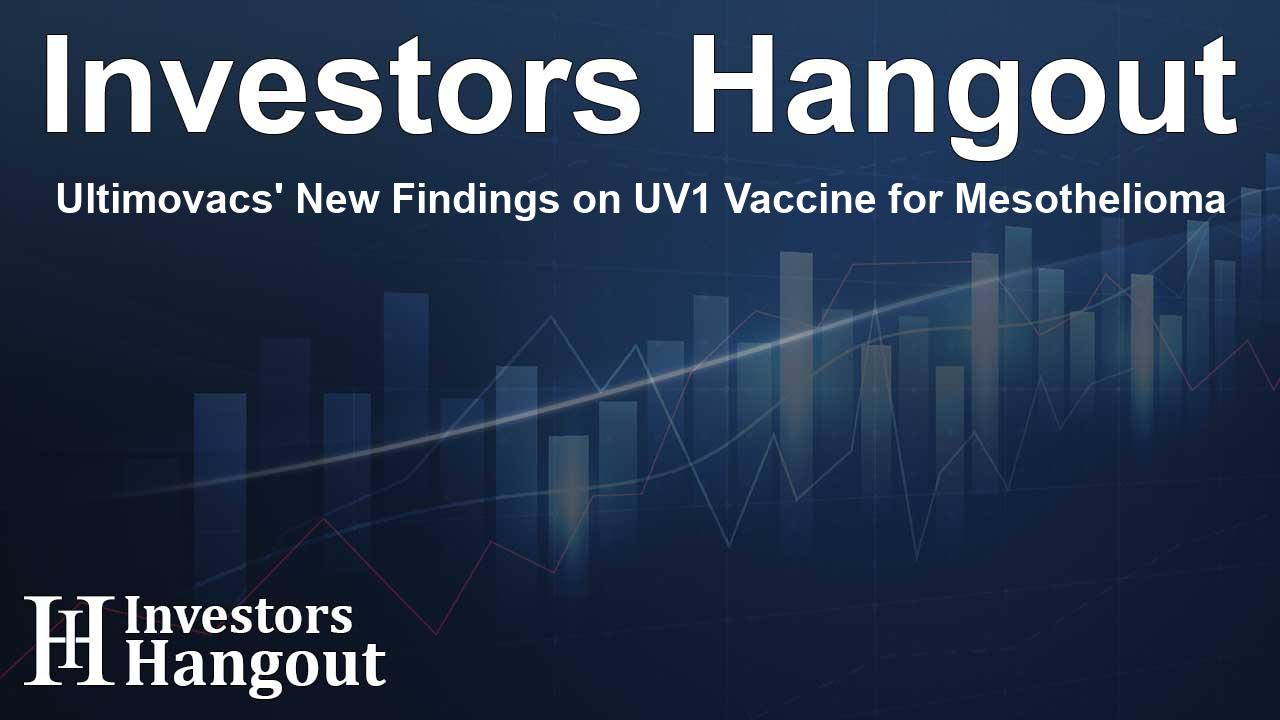Ultimovacs' New Findings on UV1 Vaccine for Mesothelioma

Ultimovacs Shares New Findings on UV1 Vaccine Trial
Oslo: Ultimovacs ASA (OSE: ULTI), a leading biotechnology company focused on developing innovative immunotherapies for cancer, has revealed exciting results from its UV1 Phase II NIPU trial. These updated findings were presented at the prestigious ESMO 2024 Congress in Barcelona. This trial is particularly important as it investigates the effectiveness of UV1, a telomerase vaccine, when used alongside traditional immunotherapy drugs ipilimumab and nivolumab for patients with inoperable malignant pleural mesothelioma.
Key Clinical Insights from the NIPU Trial
Initially reported at ESMO 2023, the trial did not achieve its primary goal of improving progression-free survival (PFS) based on blinded, independent central review (BICR). However, important secondary endpoints indicated promising results, including a doubling of the objective response rate (ORR) and a significant 27% decrease in the risk of death.
Improved Outcomes for the Epithelioid Subgroup
At this year's congress, Ultimovacs emphasized a notable improvement observed in patients from the epithelioid subgroup, which accounts for about 70% of mesothelioma cases. For this group, the trial showed an impressive 5.5-month increase in median PFS when UV1 was combined with ipilimumab and nivolumab, compared to just 2.9 months with these immunotherapies alone.
Presentation Highlights and Future Directions
The detailed results of this study were presented in a poster at the congress. An abstract summarizing these findings will soon be available on Ultimovacs' official website. This ongoing research reflects Ultimovacs’ dedication to addressing significant unmet medical needs for patients with mesothelioma.
Expert Commentary on the Research
Jens Bjørheim, Chief Medical Officer at Ultimovacs, commented on the potential implications of these findings, suggesting strong reasons to further explore UV1 as a treatment for this challenging condition. Ultimovacs is committed to providing new hope where existing treatments may not suffice, and they plan to engage with the wider medical community to discuss future strategies.
Overview of the NIPU Trial
The NIPU trial is a randomized, open-label, multi-center Phase II study initiated by investigators and supported by Oslo University Hospital, Bristol-Myers Squibb, and Ultimovacs. It involved 118 patients across six hospitals in different countries, aiming to enhance treatment options through the UV1 vaccine in conjunction with established immunotherapies.
In the trial, participants were divided into two groups: both groups received standard treatment with nivolumab and ipilimumab, while the experimental group also received the UV1 vaccine. This cohort was expected to experience significant clinical benefits compared to those receiving only the standard treatment.
About the UV1 Vaccine
UV1 is designed to stimulate a targeted immune response against telomerase, a critical protein present in many cancer cells. The vaccine comprises synthetic peptides intended to activate immune cells essential for fighting tumors. Notably, this promising vaccine does not require prior HLA screening, which may allow it to be accessible to a broader patient population.
Ultimovacs' Broader Vision and Development Plans
As a clinical-stage company, Ultimovacs is actively engaged in a comprehensive clinical development program, which includes five Phase II trials across various cancer types, enrolling over 750 patients globally. The findings from the NIPU trial could potentially lead to wider applications of UV1 and similar innovative therapies, reinforcing Ultimovacs’ vision of transforming cancer treatment.
Frequently Asked Questions
What is the main goal of the NIPU trial?
The NIPU trial aims to evaluate the effectiveness of the UV1 vaccine combined with immunotherapy for treating malignant pleural mesothelioma.
What were the primary findings presented at ESMO 2024?
The trial showed a doubling of objective response rates and an improvement in progression-free survival for the epithelioid subgroup of mesothelioma patients.
Who is conducting the NIPU trial?
The trial is sponsored by Oslo University Hospital and supported by Ultimovacs and Bristol-Myers Squibb.
How does UV1 work as a treatment?
UV1 induces a specific immune response against telomerase, aiming to boost the body's ability to combat cancer cells effectively.
What are the future plans for Ultimovacs?
Ultimovacs plans to continue exploring the benefits of UV1 and similar therapies while expanding its clinical research in various cancer types.
About The Author
Contact Thomas Cooper privately here. Or send an email with ATTN: Thomas Cooper as the subject to contact@investorshangout.com.
About Investors Hangout
Investors Hangout is a leading online stock forum for financial discussion and learning, offering a wide range of free tools and resources. It draws in traders of all levels, who exchange market knowledge, investigate trading tactics, and keep an eye on industry developments in real time. Featuring financial articles, stock message boards, quotes, charts, company profiles, and live news updates. Through cooperative learning and a wealth of informational resources, it helps users from novices creating their first portfolios to experts honing their techniques. Join Investors Hangout today: https://investorshangout.com/
The content of this article is based on factual, publicly available information and does not represent legal, financial, or investment advice. Investors Hangout does not offer financial advice, and the author is not a licensed financial advisor. Consult a qualified advisor before making any financial or investment decisions based on this article. This article should not be considered advice to purchase, sell, or hold any securities or other investments. If any of the material provided here is inaccurate, please contact us for corrections.
